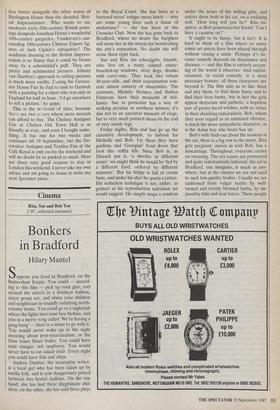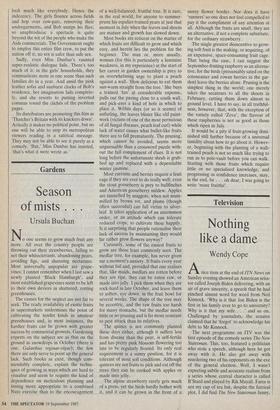Cinema
Rita, Sue and Bob Too
(`18', selected cinemas)
Bonkers in Bradford
Hilary Mantel
Suppose you lived in Bradford, on the Buttershaw Estate. You could — accord- ing to this film — pick up your giro, reel around the streets in a drunken fashion, enjoy group sex, and abuse your children and neighbours in roundly satisfying north- country terms. You could go to a nightclub where the lights turn your face fuchsia, and join in a merry song called 'We're having a gang-bang' — there is a mime to go with it. You would never wake up in the night sweating about post-structuralism, or the Dow Jones Share Index. You could have malt vinegar, not raspberry. You would never have to eat salade tiede. Every night you could have fish and chips.
Andrea Dunbar, the screenplay writer, is a local girl who has been taken up by media folk, and is now dangerously poised between two horrid realities. On the one hand, she has had three illegitimate chil- dren; on the other, she has sold three plays to the Royal Court. She has been at a battered wives' refuge; more lately — why are some young lives such a tissue of misfortune? — she has been at the Groucho Club. Now she has gone back to Bradford, where no doubt the burghers will stone her in the streets for besmirching the city's reputation. No doubt she will stone them right back.
Sue and Rita are schoolgirls, friends, who live on a nasty council estate: boarded-up windows, stray dogs, drunks with carry-outs. They look like robust 40-year-olds, and their conversation con- sists almost entirely of obscenities. The actresses, Michele Holmes and Sioban Finneran, have their moments of bril- liance. Sue in particular has a way of walking peculiar to northern women; it's due not to an ancestral memory of clogs, but to very small pointed shoes on the end of very sturdy legs.
Friday nights, Rita and Sue go up the executive development, to babysit for Michelle and Bob. Up there they have gardens, and 'Georgian' front doors that look like coffin lids. Since Bob is, as Disraeli put it, 'a dweller in different zones', we might think he would be led by a different food, ordered by different manners', But his fridge is full of cream buns, and under his shirt he sports a tattoo. His seduction technique is not, either, as genteel as his reproduction television set would suggest. He simply snaps a condom under the noses of the willing girls, and enjoys them both in his car, on a reclining seat. 'How long will you be?' Rita en- quires, as Bob penetrates her friend. 'Can I have a cassette on?'
It ought to be funny, but it isn't. It is hard to think of a film where so many comic set pieces have been played through without raising a smile. Perhaps it's be- cause comedy depends on dissonance and distance — and this film is entirely accept- ing of the world it observes. And embar- rassment, in social comedy, is a most necessary feature; all these characters are beyond it. The film asks us to like them and pity them, to find them funny and to find their lives funny, but in fact the girls appear desperate and pathetic: a hopeless pair of greasy-faced witches, with no virtue in their shrieking camaraderie. Bob, whom they soon regard as an animated vibrator, is much the more sympathetic character; as is the Asian boy who beats Sue up.
Bob's wife finds out about the sessions in the car, there is a big row in the street, Rita gets pregnant, moves in with Bob, has a miscarriage. Throughout, everyone carries on swearing. The sex scenes are protracted and quite remorselessly indecent; the act in Bradford, one imagines, is much as any- where, but at the cinema we are not used to such low-quality bodies. Usually we are cushioned from vulgar reality by well- turned and evenly bronzed limbs, by im- possibly trim and neat torsos. These people look much like everybody. Hence the indecency. The girls flounce across fields and hop over cow-pats, removing their undergarments, and Bob unzips his flies; so anaphrodisiac a spectacle is . quite beyond the wit of the people who make the Aids commercials. The Government ought to employ this entire film crew, to put the nation off it; no sex is safer than safe sex.
Sadly, even Miss Dunbar's vaunted super-realistic dialogue fails. There's too much of it: in the girls' households, they communicate more in one scene than such families do in a year. And amid the pink leather sofas and sunburst clocks of Bob's residence, her imagination fails complete- ly, and she resorts to putting inverted commas round the clichés of the problem pages.
Its distributors are promoting this film as 'Thatcher's Britain with its knickers down'. Actually it makes no political point, but no one will be able to stop its metropolitan viewers reading in a satirical message. They may not be able to see it purely as a comedy. 'But,' Miss Dunbar has insisted, `that's what it were wrote as.'



































































 Previous page
Previous page